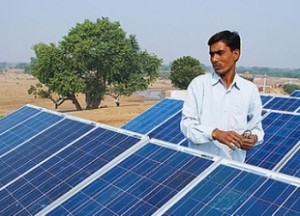India rejects Anti-dumping duties
India has decided to reject anti-dumping duties imposition on imports of solar cells and modules recommended by its ministry. The rejection  was done due to massive protests by local solar developers who would see their costs increasing due to anti-dumping duties. Even though the costs would have only increased by 5-15% in our view, the lobbies were very strong and even induced powerful ministers to voice their opinions against the imposition of duties. It is only the second time that the government has refused to impose AD duties. According to news, powerful ministers burned the midnight oil and decided not to go ahead with the impositions of these measures. Local manufacturers who were fighting for a level playing field for more than 2 years, again got burnt and many of them have seen their stock prices sliding at limit levels every day. Most of them have anyway fallen into CDR and I don’t see them survive this new blow.
was done due to massive protests by local solar developers who would see their costs increasing due to anti-dumping duties. Even though the costs would have only increased by 5-15% in our view, the lobbies were very strong and even induced powerful ministers to voice their opinions against the imposition of duties. It is only the second time that the government has refused to impose AD duties. According to news, powerful ministers burned the midnight oil and decided not to go ahead with the impositions of these measures. Local manufacturers who were fighting for a level playing field for more than 2 years, again got burnt and many of them have seen their stock prices sliding at limit levels every day. Most of them have anyway fallen into CDR and I don’t see them survive this new blow.
India suggests new ways to help domestic industry
The government in its new wisdom has decided to help the domestic manufacturing industry by giving Rs 1 crore as VGF to the defense and centrally owned companies to build solar power plants using domestic solar components. This is in addition to the domestic content requirements in the centrally funded JNNSM scheme. Note WTO has recently banned DCR in a number of solar procurement by governments. Ontario has been forced to remove its DCR and with USA going hammer and tongs against the JNNSM DCR, adverse ruling can be expected here as well.
China, USA and other countries have supported green manufacturing through massive subsidies and support which India cannot hope to match. Indian players cannot hope to compete in the export markets and the distortion has made them non-entities even in the domestic market. India’s solar demand is going to grow exponentially in the coming days and Indian manufacturers cannot hope to compete despite the large domestic market. India’s government wants to promote Indian manufacturing but the actions have yet to match the words.
Google+India has raised the stakes in an ongoing trade battle with the US at the World Trade Organization (WTO) by rolling out an ambitious campaign to promote solar energy through the Indian Army and central public sector units (CPSUs)—providing them with grants on the condition that they source equipment from domestic manufacturers. To start with, the government plans to provide viability gap funding (VGF) of Rs.1,000 crore for setting up grid-connected solar projects of 1,000MW capacity by the Indian Army, which would provide electricity to one of the largest consumers in the country at a tariff of Rs.5.50 per unit. Also, the government plans to give VGF—financial grants offered to projects that are important but may not be immediately viable financially—to CPSUs such as NTPC Ltd and NHPC Ltd for setting up another 1,000MW capacity. The cabinet will shortly take up the proposals for consideration. This is in addition to state-owned NTPC’s tender for setting up a 1,000MW capacity by using solar cells and modules made in India.


